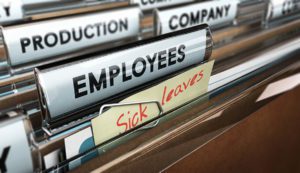 California employment laws enacted in 2015 require all employers to provide sick leave to employees regardless of the company’s size.
California employment laws enacted in 2015 require all employers to provide sick leave to employees regardless of the company’s size.
Sick leave is a paid or unpaid employee benefit allowing workers to take time off to care for themselves or their families.
The Healthy Workplaces, Healthy Families Act of 2014 mandates that employees who have worked at least 30 days within a year are eligible for sick leave. The law took effect on July 1, 2015.
This law also bars employers from creating policies restricting employee access to paid sick leave beyond their 90th day of work, and they must allow employees to use at least three days of paid sick leave per year.
How Do I Earn Paid Sick Leave?
Under the Healthy Workplaces, Healthy Families Act, employees begin earning sick leave at the start of their employment. Employers can approach sick leave in two methods: an accrual policy or a no accrual/upfront policy.
Accrual Policy
An accrual policy allows employees to earn sick leave over time, with a balance that may carry over each year of employment. The general rule is employees receive one hour of sick leave for every 30 hours of work.
While employers can use different accrual rates, the company policy must result in an employee having at least 24 hours of accrued sick leave by the 120th calendar day of employment. Typically, employees can take their three days of paid sick days after 90 days of employment.
If employees accrue more than three days of paid sick leave under the one hour per every 30 hours worked formula, California law allows employers to limit an employee’s use of paid sick leave to 24 hours or three days per year.
No Accrual/Upfront Policy
A no accrual/upfront policy means the full amount of sick leave for the year is available immediately at the beginning of a year-long period of employment. The exception is for new hires where the 24 hours must be available for use by their 120th day with the organization.
California law gives employers discretion to determine how they define a year, whether it’s a calendar year, fiscal year, or hire date anniversary.
Annual Rollover of Sick Time
An employer may limit an employee’s total accrued paid sick leave to no more than 48 hours or six days.
If an organization provides the full amount of paid sick time to employees at the beginning of each year of employment, calendar year, or 12-month period (no accrual/upfront policy), they are not required to have an accrual or carryover policy.
If your employer has retaliated against you for correctly using your paid sick leave, contact Shimoda & Rodriguez Law, PC to pursue legal action.
Can I Be Fired for Using Paid Sick Leave?
In addition to California’s paid sick leave laws, the state’s labor code protects employees from attendance policies if they use their accrued sick time.
Employees can take paid sick days for a variety of reasons. According to the law, these include:
- Diagnosis, care, or treatment of an existing health condition of, or preventative care for, an employee or an employee’s family member
- For an employee who is a victim of domestic violence, sexual assault, or stalking.
California’s Kin Care Law expands who you are allowed to use paid sick leave to care of:
- Children, including stepchildren, foster children, or adopted children
- Spouses or domestic partners
- Parents
- Siblings
- Grandchildren
- Grandparents
Unfortunately, once you’ve exhausted your hours of paid sick leave, an unscheduled absence would be subject to disciplinary action under an employer’s attendance policy.
If your employer retaliates against you for exercising your legal right to use paid sick leave, you are entitled to legal action.
Your boss cannot force you to find a replacement to cover your shift when you use paid sick leave.
What Should I Do If My Employer Takes Action Against Me?
Employers cannot demote you, threaten to fire you, threaten to report you to immigration authorities, cut your pay, fire you, or retaliate against you in any other way for using paid sick leave.
If this happens, you should reach out to Shimoda & Rodriguez Law, PC Our team of experienced employment law attorneys will determine the strength of your claim. We provide free consultations.
You may be entitled to:
- Lost wages
- Payment for withheld sick days
- Reasonable attorneys’ fees and costs
COVID-19 Supplemental Paid Sick Leave Requirements
Senate Bill 95, signed into law by California Governor Gavin Newsom on March 19, 2021, adds 80 hours of supplemental paid sick leave due to COVID-19.
The bill provides supplemental paid sick leave for covered employees who cannot work or telework due to COVID.
An employee is eligible for COVID-19 Supplemental Paid Sick Leave if:
- Caring for Yourself: You’re required to quarantine or isolate for a period of time due to COVID-19 or is experiencing symptoms of COVID-19 and seeking a medical diagnosis.
- Caring for a Family Member: You’re caring for a family member who must quarantine or isolate for a period of time due to COVID, or the employee is caring for a child whose school or place of care is closed/unavailable due to the virus on the premises.
- Vaccine-Related: You’re attending a vaccine appointment or cannot work or telework due to vaccine-related side effects.
If you took leave due to the guidelines above between January 1, 2021-March 28, 2021, you should invoke SB 95 and request payment for that leave if your employer did not pay you wages during your absence.
The statewide policy ensures employees have access to COVID-19 supplemental paid sick leave through September 30, 2021.
Shimoda & Rodriguez Law, PC Specializes in Cases Involving Sick Leave
If your employer has neglected to pay you for sick leave taken due to COVID-19, retaliated for the use of your accrued or allocated sick leave hours, or required you to contact a coworker to cover shifts, you may have an employment law case.
How We Approach Paid Sick Leave Cases
- Initial consultation: Our attorneys will speak with you and gather the specifics about your case.
- Review & Plan: Once we have the specifics and the documentation of your paid sick leave case, our team can build a legal strategy to achieve your best outcome.
- Representation & Resolution: While we will explore whether an amicable resolution with your employer is possible, there are times where the matter must go to court. In this instance, our firm will aggressively represent you and pursue an outcome in your best interest.

